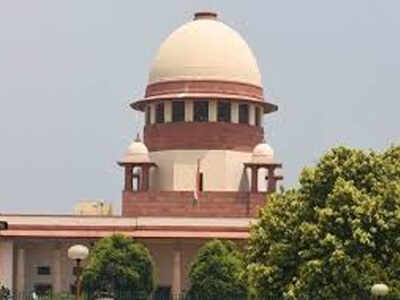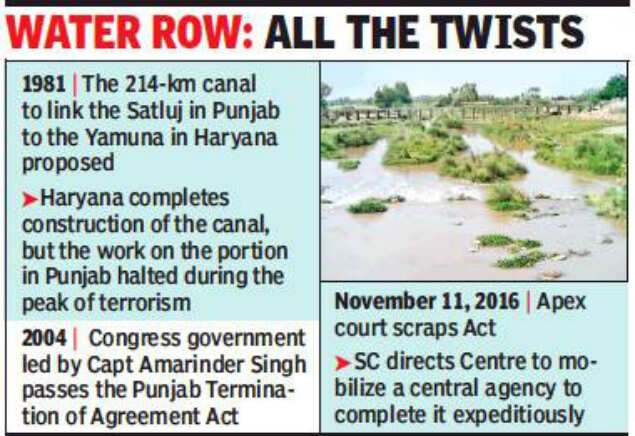
PATIALA: In a development with political ramifications for Haryana, which will hold assembly polls in October this year, the Supreme Court on Tuesday directed the states of Punjab and Haryana and the Centre to resolve the Satluj Yamuna Link (SYL) canal issue by September 3, which has also been fixed as the next date of hearing.

The apex court directed the two states and the Centre to convene a meeting and find an amicable solution to the issue that had been lingering on since the Supreme Court in July 2017 asked Punjab to first build the SYL canal before bringing their respective points of view and challenges on the vexed issue.
The SC has since maintained that the orders passed by it on the SYL canal issue have to be “respected and executed” by the governments of Punjab and Haryana.
Last year, the Haryana government had moved the SC seeking an early solution to the row over the SYL canal.
The Supreme Court had on November 11, 2016 declared the Punjab government law (passed in 2004) that it would not share water with Haryana as ‘unconstitutional’. It had also directed the Centre to mobilise a central agency to take control of the canal works immediately and complete it expeditiously.
Immediately after the decision, the SAD-BJP government in Punjab had de-notified the land and even returned Haryana’s share, stating that it could not share even a single drop of water.
The Haryana government had then moved the Supreme Court that then stayed the Punjab government proceedings.
SYL: SC had asked govt to find solution
While CM Amarinder Singh had been supporting the resolution of the contentious issue through dialogue, he has time and again clarified that the state did not have any surplus water to share with Haryana. For Haryana farmers and Punjab agriculturists, the issue is equally emotive and can sway of votes in both the states.
The 214-km canal that was to link the Satluj in Punjab to the Yamuna in Haryana was proposed in 1981for effective allocation of water. Haryana completed construction of the canal, but work on the portion in Punjab was halted after the initial phase of construction during the peak of terrorism.
This led to a spate of litigations. In 2004, the Congress government led by Amarinder Singh passed the Punjab Termination of Agreement Act with the intention to terminate the 1981 agreement and all other pacts relating to sharing of waters of the Ravi and Beas. The law had been passed after the SC in 2002 asked Punjab to honour its commitment with regard to water-sharing with Haryana. This Act was scrapped by the SC on November 11, 2016.
Punjab challenged the verdict, but the SC rejected it and asked the Centre to take over the remaining construction of the project.
However, given the sensitivities involved that could have led to a law and order situation in both Punjab and Haryana, the court asked the Centre to engage both states and find an amicable solution. The Union minister for water resources has conducted a number of meetings with the states, but a settlement is yet to be reached.

The apex court directed the two states and the Centre to convene a meeting and find an amicable solution to the issue that had been lingering on since the Supreme Court in July 2017 asked Punjab to first build the SYL canal before bringing their respective points of view and challenges on the vexed issue.
The SC has since maintained that the orders passed by it on the SYL canal issue have to be “respected and executed” by the governments of Punjab and Haryana.
Last year, the Haryana government had moved the SC seeking an early solution to the row over the SYL canal.
The Supreme Court had on November 11, 2016 declared the Punjab government law (passed in 2004) that it would not share water with Haryana as ‘unconstitutional’. It had also directed the Centre to mobilise a central agency to take control of the canal works immediately and complete it expeditiously.
Immediately after the decision, the SAD-BJP government in Punjab had de-notified the land and even returned Haryana’s share, stating that it could not share even a single drop of water.
The Haryana government had then moved the Supreme Court that then stayed the Punjab government proceedings.
SYL: SC had asked govt to find solution
While CM Amarinder Singh had been supporting the resolution of the contentious issue through dialogue, he has time and again clarified that the state did not have any surplus water to share with Haryana. For Haryana farmers and Punjab agriculturists, the issue is equally emotive and can sway of votes in both the states.
The 214-km canal that was to link the Satluj in Punjab to the Yamuna in Haryana was proposed in 1981for effective allocation of water. Haryana completed construction of the canal, but work on the portion in Punjab was halted after the initial phase of construction during the peak of terrorism.
This led to a spate of litigations. In 2004, the Congress government led by Amarinder Singh passed the Punjab Termination of Agreement Act with the intention to terminate the 1981 agreement and all other pacts relating to sharing of waters of the Ravi and Beas. The law had been passed after the SC in 2002 asked Punjab to honour its commitment with regard to water-sharing with Haryana. This Act was scrapped by the SC on November 11, 2016.
Punjab challenged the verdict, but the SC rejected it and asked the Centre to take over the remaining construction of the project.
However, given the sensitivities involved that could have led to a law and order situation in both Punjab and Haryana, the court asked the Centre to engage both states and find an amicable solution. The Union minister for water resources has conducted a number of meetings with the states, but a settlement is yet to be reached.
World Cup 2019
Trending Topics
LATEST VIDEOS
More from TOI
Navbharat Times
Featured Today in Travel
Quick Links
Lok Sabha Election Schedule 2019Lok Sabha Election NewsDelhi Capitals teamMI team 2019Rajasthan Royals 2019RCB team 2019Maharashtra Lok Sabha ConstituenciesBJP Candidate ListBJP List 2019 TamilnaduShiv Sena List 2019AP BJP List 2019Mamata BanerjeeBJP List 2019 MaharashtraPriyanka GandhiBJP List 2019 KarnatakaAMMK Candidate List 2019BJP List 2019 WBLok Sabha Elections in Tamil NaduBSP List 2019 UPNews in TamilLok Sabha Poll 2019Satta Matka 2018PM ModiMahagathbandhanNagpur BJP Candidate ListChandrababu NaiduTamil Nadu ElectionsUrmila MatondkarNews in TeluguMadras High CourtTejashwi YadavArvind KejriwalTejasvi SuryaPawan KalyanArvind KejriwalYogi AdityanathJaya PradaSatta King 2019Srinagar encounter
Get the app







